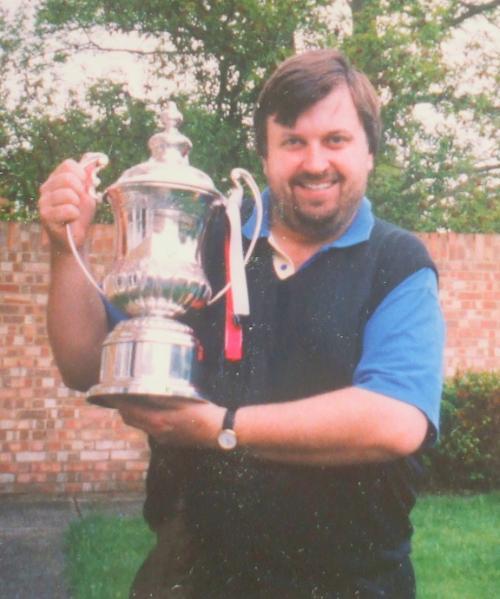Lest We Forget: In Memory of Maidenhead and Maidenhead Norfolkians Players Who Lost Their Lives in The Two World Wars Part Three: First World War
31/10/2022 - 4.26
Mark Smith and Matthew Shaw
This is the third in a series of articles that commemorates the lives of Maidenhead and Maidenhead Norfolkians players who made the ultimate sacrifice in World War One and World War Two, based on the Maidenhead United FC match day programme series entitled Lest We Forget.
Horace James Wise
Horace James Wise was born in 1891, the second child of Alfred Wise, a bricklayer, from Finchampstead, and his wife Maria (née Woodward), a sweet shop owner, who lived in “Woodlands”, Belmont Road, Maidenhead. Alfred and Maria had married at Cookham in 1888. Horace had two siblings, Albert George (known as George) who was born in 1889, and Elizabeth Maria, born in 1896.
Ten years later, on the 1901 Census, the family can be found living with their parents at 18 Moffatt Street, Maidenhead, along with his elder brother George and younger sister Elizabeth. The census of 1911, states that Horace, who by now was a warehouse porter, was working in the Hosiery department of Messer’s J. and R. Morley, and living at 18 Charterhouse Street, London whilst the rest of the family resided at “Evelyn Cottage”, Alexandra Road, Maidenhead.
Horace played for the Maidenhead Reserve side in the 1913/14 season making a dozen known appearances scoring five times, including a brace in the Berks and Bucks Junior Cup tie at home to Knowl Hill and Littlewick United at the end of November.
He first joined the Army and enlisted with the Royal Berkshire Regiment, but was declared as unfit for service on 8th November 1915. He later joined the 184th Company, Machine Gun Corps on 11th October 1916 and before that worked as a temporary Postman. On 16th February 1917, Horace arrived at the Field Billet and, two months later, on 10th April, Horace was deprived of six days pay for losing, by neglect, his iron rations. He was in trouble again on 31st May, for being absent from the Billet between 9.00pm and 9.20pm, and for this he was deprived two days’ pay.
On 27th August 1917, Horace was wounded in action; he received a gunshot wound to his left buttock and hip as well as shrapnel wounds to his abdomen. Horace was evacuated to the 14th General Hospital on 28th August 1917, before being sent back to England where he was transported to the Sunderland War Hospital on 30th August, where his wounds were cleaned and he underwent a Laparotomy which found that the wounds had not penetrated his bowels. He stayed there until he was passed fit for duty on 1st December 1917, whereupon he received ten days leave staying at 14 Belmont Road, Maidenhead, before reporting back to Belton Park Military School, Grantham, for Machine Gun training.
It is not clear whether Horace returned to fight at the front as his military records are very patchy. However, on 20th February 1919, Horace became unwell. He was admitted to the Belton Park Military Hospital in Grantham on 25th February and was found to be suffering from Influenza and Bronchial Pneumonia and, despite all efforts to save him, Horace sadly passed away on 27th February 1919 at 5.30am and was pronounced dead by the duty Medical Officer fifteen minutes later.
He left behind his father Alfred, mother Maria and siblings George and Elizabeth. His mother, who was still residing at 14 Belmont Road in Maidenhead, added to his headstone in Maidenhead Cemetery the words 'IN LOVING MEMORY’ followed by 'HE GAVE HIS LIFE FOR US’, which cost her 9s 4d.
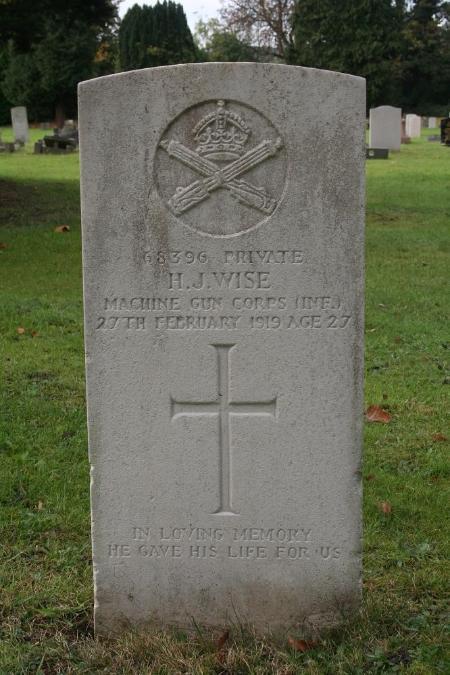
Source: Nicola Carpenter
Note
Horace James Wise sadly remains the only person we have been unable to find a photograph of - not through a lack of trying, as living family members were traced but unfortunately unable to assist.
Known Reserve team appearances = 12, 5 goals (would have been more but our records are decidedly incomplete)
Presumed Debut – 18th October 1913 v Hedsor and Upper Bourne End (South Bucks and East Berks League)
Presumed Final appearance – 14th February 1914, at Slough Reserves (Berks and Bucks Junior Cup)
Frederick William Moore
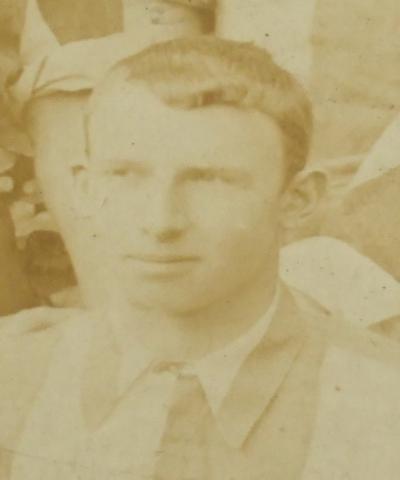
Source: Matthew Shaw
Frederick William Moore was born in Maidenhead in 1876 to Charles and Ellen Moore. He was an apprentice at Messrs. Coopers & Sons, Maidenhead and became a carpenter and joiner by trade.
Frederick was one of the Maidenhead Norfolkians top players. Nicknamed “Jumbo”, he became one of the best forwards in the Home Counties with a very impressive goal scoring record.
He started playing football for Maidenhead Norfolkians B-Team in 1891, at the age of fifteen before moving on to Furze Platt FC where he became their deputy captain aged nineteen. Frederick played regularly for Maidenhead FC Reserves from the summer of 1896 for two seasons before re-joining the Maidenhead Norfolkians in 1898. He also assisted Marlow occasionally.
During his time with the Norfolkians, Frederick helped the club win the Berks and Bucks Junior Cup, the Curzon Shield (as Champions of the South Bucks and East Berks League), the High Wycombe Cup, the West Berks League, the Berks and Bucks League and the Oxford Charity Cup twice. He was the Norfolkians captain from 1903 until 1906, and considered a “…sound and hard-working forward”. In his last full senior season for the Norfolks, he led them to their first appearance in the Berks and Bucks Senior Cup Final. Frederick left the Norfolkians in 1909 but his involvement in local football continued when he joined the Maidenhead Territorial team that entered the junior football ranks.
Frederick was a member of the Berkshire Volunteers Regiment “G” Company that went to South Africa where he earned the South African medal during the Boer War. He remained a member of his Territorial Regiment with the rank of Sergeant and was away training with the Berkshires when war was declared in the summer of 1914 and Frederick was sent out to France with the Maidenhead “G” Company.
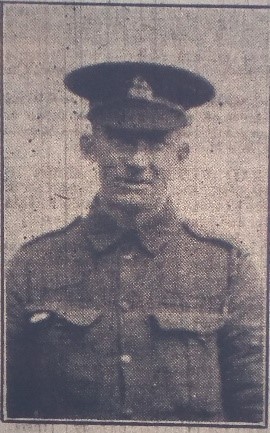
Source: Matthew Shaw
Whilst in France, Frederick became company Quartermaster Sergeant, serving with great bravery and distinction on the Somme. He was made Acting Sergeant Major shortly before he was killed on the 10th December 1916, when a shell exploded at his Company’s headquarters. He was buried by his Regiment after the attack with a cross being erected on his grave, but this was lost in the chaos of the ever changing front line. Frederick now has no known final resting place but is commemorated on the Thiepval Memorial (photograph below) and on the Maidenhead War Memorial in St Ives Road.
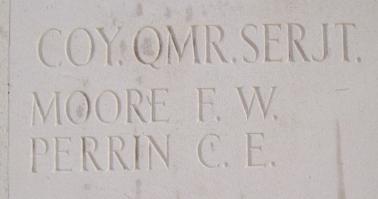
Source: Matthew Shaw
At the time of his death Frederick was 40. Much sympathy was sent to his parents, his wife Charlotte and their three daughters, including a letter from his Commanding Officer saying it was a great loss to him personally as he was his right hand man who would be missed by all the men in his Company.
The loss of Frederick Moore was felt amongst all local football supporters who could not believe that such a fixture on and off the field in their football world was gone never to return.
Known Maidenhead FC Reserve team appearances = 18, 11 goals (would have been more but detailed information unavailable)
Presumed Debut – 24th March 1894 v Old Owenians (friendly)
Presumed Final appearance – 8th April 1898 v Maidenhead Norfolkians Reserves (South Bucks & East Berks League)
Known Maidenhead Norfolkians FC appearances = 121, 62 goals
Presumed Senior team debut - 30th September 1899 v Maidenhead (FA Cup)
Presumed Final appearance – 26th September 1908 v Hanwell (Great Western Suburban League)
Ernest Smith
Ernest Smith was born in Great Yarmouth, Norfolk in 1885, the son of Josiah and Emma Smith, and he resided in the coastal town until he was in his early twenties. The family then moved to Maidenhead and, in 1911, they lived at 38 Clare Road. Ernest was employed as a Solicitors Clerk.
He had already built quite a reputation as a sprinter and was nicknamed the “Yarmouth flyer” or the “Maidenhead flyer” depending on which newspaper you read. He represented the Maidenhead Wanderers Cycling and Athletic Club predominantly in the 440 yards’ event and competed in many local athletics meetings throughout the South of England. He later became Assistant Secretary of the MWCAC and was also a member of the committee.
Ernest put his skills as a sprinter to good use, firstly with the Maidenhead FC Reserve team whom he joined during 1908/09 season and remained a player at York Road until the latter part of the 1909/10 season. At some point he must have come to the attention of the Maidenhead Norfolkians and he became a “red and white” at the start of the 1910/11 season as an outside left, where he would out run many an opponent on his way to goal.
In 1912, Ernest took over the role of Secretary of Maidenhead Norfolkians from one of the founding fathers of the club, Harry Maisey. In just his second season, Ernest showed that he was a very good Club Secretary and combining this with his efforts on the field of play, he helped the Norfolkians reach the Berks and Bucks Final for their third appearance. In the 1913/14 (the last ever Maidenhead Norfolkians FC) season, Ernest was beginning to make his mark on the club by bringing in new, younger players who ultimately helped the Norfolkians secure runners-up position in the Great Western Suburban League.
Ernest enlisted in the Army at Reading in January 1916 and joined the Royal Garrison Artillery. He was sent to fight in France. He was serving in the 19th Siege Battery, when he was killed in action on the 30th October 1918, only twelve days before the armistice was called.
He was 33 years old and was buried in Le Cateau Military Cemetery in France.
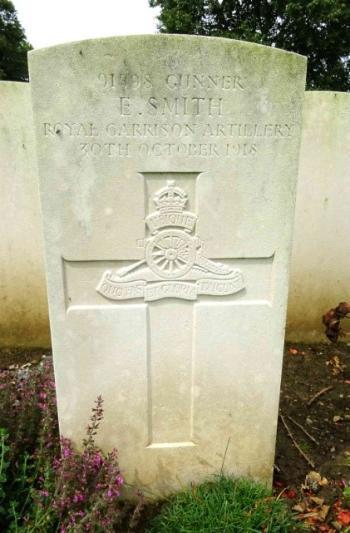
Source: Matthew Shaw
He is also commemorated on the Great Yarmouth War Memorial (photo below). Although he lived in Maidenhead for at least eight years, he is not included on any War Memorial in the town.
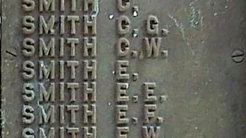
Source: David Tubby
Historical Footnote
There is absolutely no doubt that had Ernest Smith survived the war then, in 1919, the Maidenhead Norfolkians would have reformed as a football club in their own right and would not have been absorbed into Maidenhead FC. Meetings were held regularly to try and revive the Norfolkians but, at the Annual General Meeting of Maidenhead Football Club in July 1920, the suffix “United” was added to the club name to try to placate the protests. At the aforementioned AGM, Harry Maisey brought forward the motion to add the suffix saying that it would do away with a lot of ill feeling and prevent future opposition and attempts to restart the Norfolkians and, after much debate, his motion passed, and did indeed suppress the anger felt by former Norfolkian members.
Known Maidenhead FC Reserve team appearances = 13, 4 goals (would have been considerably more but detailed information unavailable)
Presumed Debut – 5th December 1908 at Marlow Reserves (South Bucks and East Berks League)
Presumed Final appearance – 5th February 1910 v Windsor & Eton Reserves (Berks and Bucks Junior Cup)
Known Maidenhead Norfolkians FC appearances = 70, 12 goals (would have been considerably more but detailed information unavailable)
Presumed Senior team debut – 3rd September 1910 v 1st Coldstream Guards (Great Western Suburban League)
Presumed Final appearance – 14th April 1914 v 3rd Coldstream Guards (Great Western Suburban League)
“It was only natural that he should be a Norfolkian since he hailed from the County of Norfolk”
The Harris Brothers – Robert and Stephen
Robert and Stephen Harris were the sons of Herbert Edward and Annie Elizabeth Harris of 12 Holmanleaze, Maidenhead.
Robert and Stephen’s father, Herbert Edward Harris, a local builder, was involved with the Maidenhead Football Club and he and Robert were listed amongst those who attended the 1914 Annual General Meeting. It was also reported that Robert and Stephen became club members in August of that year but, until very recently, no evidence could be found of the brothers playing for Maidenhead FC. However, a match report was finally unearthed which showed them appearing for the Maidenhead FC Reserve side in the final South Bucks and East Berks League game of the 1913/14 season against Wycombe Wanderers Reserves on 29th April. The brothers almost certainly assisted the side at the end of that season when the Reserve team played seven games in six days to complete their fixtures, but this is the only mention of them playing for the club that has been found.
Robert (pictured below) was born in 1897 and worked in the printing trade before joining the 8th Battalion Royal Berkshire Regiment as a Private. He was fighting as part of the force at the Somme who were attempting to take Contalmaison in Northern France, when he was killed in action after a heavy enemy bombardment near the Bapaume Road on 25th July 1916.
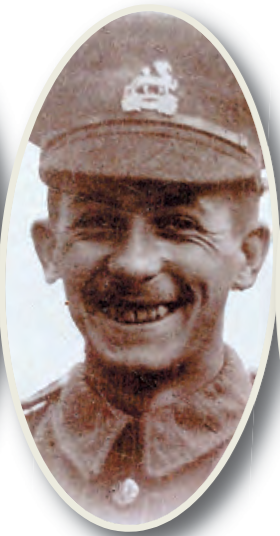
Source: Matthew Shaw
His brother, Stephen (pictured below), was born in 1898 and was serving as a Lance Corporal in the 2nd Battalion Royal Berkshire Regiment, when he was killed in action at the Somme Salient on 4th March 1917. He was part of the forces in the front line that were ordered to attack the Pallas and Fritz trenches. Stephen was subsequently posted as missing, presumed dead.
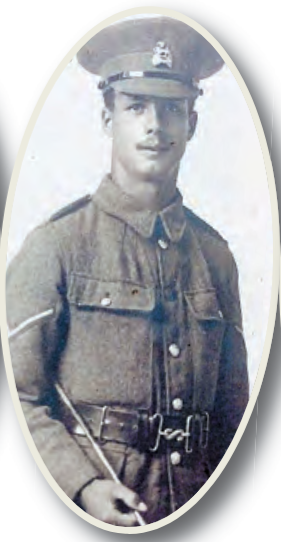
Source: Maidenhead Advertiser
Robert and Stephen were both nineteen years old when they were killed. They have no known graves, but are commemorated on the Maidenhead War Memorial, Thiepval Memorial and also on the Memorial in St Luke’s Church in Norfolk Road, Maidenhead.


St Luke's Church Memorial, Maidenhead: Source Gillian Healey
Robert and Stephen Harris
Known Maidenhead FC Reserve team appearances = 1 each (and an unnamed brother scored one goal) (would almost certainly have been more but detailed information unavailable)
Debuts – unknown
Final appearance - 29th April 1914 at Wycombe Wanderers Reserves (South Bucks and East Berks League)
Additional Information and Sources
Berkshire Yeomanry Museum website
Dave Cannon
Nicola Carpenter
Gillian Healey
Lesley Norris
Carrie Pike
Steve Roberts
Steve Rolls
Malcolm Summers
David Tubby of the Great Yarmouth History and Archaeological Society
Biographies
Mark Smith attended his first Maidenhead match in March 1976 and continued to watch games fairly regularly for the next forty years. He was responsible for producing the club’s first ever “Handbook” in 1978, and has researched and chronicled the club’s history ever since. He was responsible for organising five exhibitions on the club, two at Maidenhead Library and three at the Maidenhead Heritage Centre (“The Magpies Story”). He has also written four books – Maidenhead FC 1870 – 1914; Maidenhead United 1919 – 1995; Maidenhead United 1995 - 2005, and, to coincide with the club’s 140th anniversary, published a 352-page detailed history entitled “One for Sorrow, Two for Joy” in 2011.
Aside from writing many series for the match programme (such as “Past Maidenhead Greats” and “An A-Z of Maidenhead United”) together with standalone articles, Mark also compiled “One of the Fifteen” on the fifteen players who appeared in the first ever Maidenhead FC match in December 1870, and “Lest We Forget” on those associated with Maidenhead FC and Maidenhead Norfolkians who lost their lives during the two World Wars. He also arranged to have the Maidenhead United Heritage website created - www.mufcheritage.com in 2009.
Matthew Shaw has played for several local football teams and became interested in the history of local football as members of his family have always been involved in football in the Berks and Bucks Counties as far back as the 1870s.
When researching family involvement in clubs in the combined counties, Matthew focused on pre First World War local football and the impact the war had on local teams.
Matthew has researched the Maidenhead Norfolkians FC in depth and helped the Maidenhead United FC Historian Mark Smith on all things Norfolkians. This meant he was also greatly involved in Mark's series "Lest We Forget" that was featured in Maidenhead United home programmes, as Matthew had already researched a large number of the town's footballers from both Senior and Junior clubs who had lost their lives in the Great War.
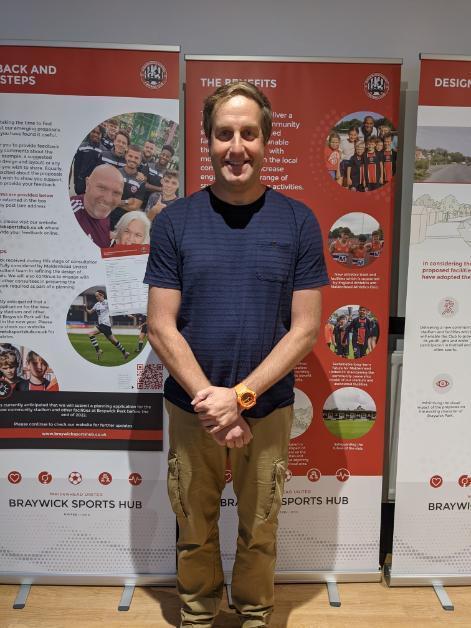


/prod01/wlvacuk/media/departments/digital-content-and-communications/images-2024/240328-Varsity-Line-Up-Resized.jpg)
/prod01/wlvacuk/media/departments/digital-content-and-communications/images-18-19/220325-Engineers_teach_thumbail.jpg)
/prod01/wlvacuk/media/departments/digital-content-and-communications/images-2024/240515-Spencer-Jones-Award-Resized.jpg)
/prod01/wlvacuk/media/departments/digital-content-and-communications/images-2024/240320-Uzbekistan-Resized.jpg)
/prod01/wlvacuk/media/departments/digital-content-and-communications/images-2024/240229-The-Link-Resized.jpg)
/prod01/wlvacuk/media/departments/digital-content-and-communications/images-2024/240516-Andy-Gibson-Resized.jpg)
